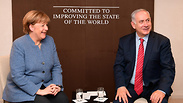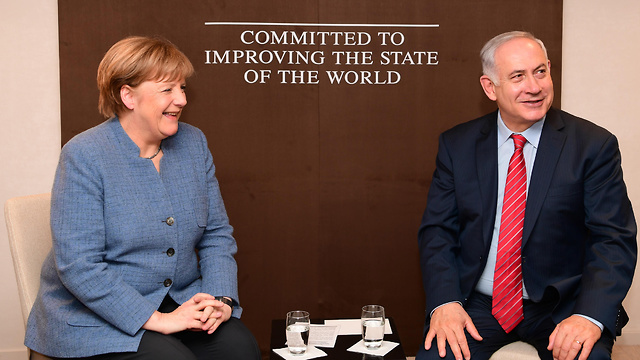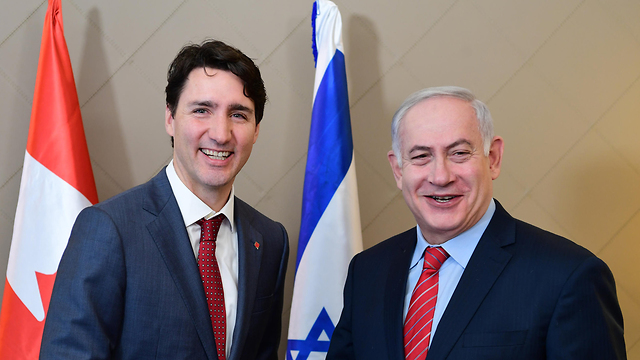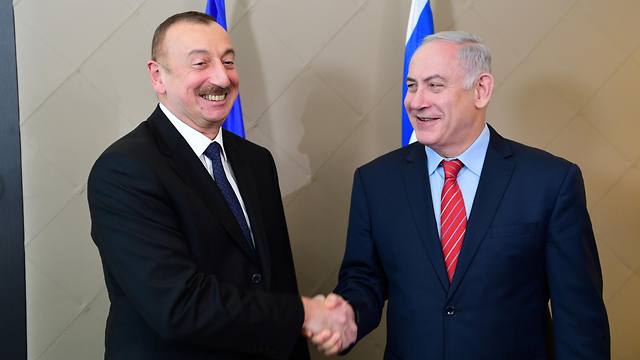
Chancellor Merkel (L) and PM Netanyahu
צילום: עמוס בן גרשום / לע"מ
PM Netanyahu leverages Davos summit to push for changes to nuclear deal
Attending Davos World Economic Forum summit, PM Netanyahu tells German Chancellor Merkel, 'Only option is putting in real changes to nuclear deal'; in meetings with Canadian, Belgian, Swiss heads of state, PM reiterates same point; Netanyahu also met with Rwandan President Kagame, set to receive asylum seekers expelled from Israel.
Prime Minister Benjamin Netanyahu met German Chancellor Angela Merkel in Davos, Switzerland, as part of his participation in the World Economic Forum's annual summit. Netanyahu also leveraged his attendance in the event to speak with other heads of state in an attempt to convince them to push for changes to the nuclear agreement with Iran.
At the conclusion of the premier's meeting with his German counterpart, Netanyahu said, "It was a significant meeting, in which we naturally spoke of the Iranian nuclear agreement. I told her that by my estimate the only viable option right now is putting in real—rather than cosmetic—changes to prevent Iranian nuclearization. Otherwise, its nuclearization is assured by the agreement's current promulgation."
"I expressed my gratitude for Chancellor Merkel's real commitment to Israel's security," the prime minister continued. "She also reiterated that commitment herself. She said she understood our concerns regarding the agreement, but did not necessarily concur with the manner in which we wanted to go about handling it."

PM Netanyahu (R) met with German Chancellor Merkel to discuss the nuclear deal (צילום: עמוס בן גרשום / לע"מ)
Netanyahu also met with Canadian Prime Minister Justin Trudeau, Belgian Prime Minister Charles Michel and Swiss President Alain Berset Wednesday morning, and spoke to them about the nuclear deal, appealing to them to make use of the window of opportunity created following President Donald Trump's declaration giving the deal "one last chance" before sanctions are imposed again.
The prime minister further elucidated he did not intend to allow Iran to militarily entrench itself in Syria and that Israel would take active measures to prevent that from occurring.
On the Palestinian issue, Netanyahu said he could not compromise on Israel's security needs in any prospective future settlement. In addition, he outlined changes currently taking places in the Middle East and the opportunities created in their wake.
The prime minister also iterated to the world leaders his desire to deepen economic and technological collaborative ties with their respective countries. In his meeting with Swiss President Berset, for instance, the two heads of state agreed that new actions needed to be undertaken to engender new tracks for economic cooperation between the two countries.
A message published later by the Prime Minister's Office stated Netanyahu had invited the world leaders he met with in Davos to visit Israel.
After his meeting with Merkel, Netanyahu convened with Rwandan President Paul Kagame, president of the country with which Israel had signed an agreement to receive Sudanese and Eritrean asylum seekers.
The Rwandan foreign minister clarified earlier Wednesday, however, that the east African country will never consent to receiving any migrants deported there against their will.
"Our open door policy only concerns those arriving to Rwanda of their own free will, without pressures being exerted on them," he said. "Any manipulation carried out on women, men and children in distress is appalling."













